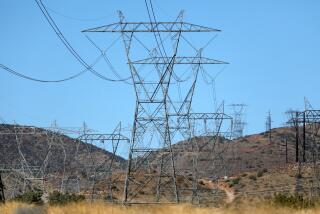Supreme Court Rules Utility Pole Fees Can Be Regulated by the FCC
- Share via
The U.S. Supreme Court ruled Wednesday that federal regulators can limit the rates utility companies charge cable operators to use utility poles to provide high-speed Internet access, a victory for cable giants AT&T; Corp. and AOL Time Warner Inc.
There are more than 6.4 million Americans who subscribe to the fast Internet access through cable operators, while roughly 3 million get similar services from telephone companies using a technology called digital subscriber line.
Overturning a lower court ruling, the Supreme Court said the Federal Communications Commission has the discretion to limit rates for utility pole use, regardless of the type of service offered. The high court said the rules also apply to equipment wireless telecommunications providers attach to poles.
Utility companies and cable operators have been fighting over the fees for so-called pole attachments, stringing service lines to 35-foot to 40-foot poles mostly owned by power companies. A 1978 law required companies that allow attachments to do so on reasonable terms and conditions.
The FCC in recent years had regulated the terms and the rates cable companies paid, including companies that offered high-speed Internet service, leading to the court challenge by utility companies.
The Supreme Court’s decision reversing and remanding the case back to the appeals court could prove pivotal for the deployment of high-speed Internet service. Cable companies had warned that rates might go up if the owners of poles could charge any fee.
The National Cable & Telecommunications Assn. has said that, in one case, a utility company demanded $38 a pole per year, up from $7.
The association warned that, if rates were unregulated, the cost for cable service could rise $1.50 a month on average.
“We believe the FCC will tentatively decide this matter before long and that it is likely to determine that cable broadband is an information service, thus keeping it free from regulation,” Legg Mason analyst Blair Levin said in a research note.
The U.S. Court of Appeals for the 11th Circuit had ruled that, because the Internet has not been defined as a cable service, the FCC could not regulate prices. The appeals court also had ruled that the FCC lacked the authority to regulate the placement of wireless equipment on utility poles and the rates charged.
More to Read
Inside the business of entertainment
The Wide Shot brings you news, analysis and insights on everything from streaming wars to production — and what it all means for the future.
You may occasionally receive promotional content from the Los Angeles Times.










